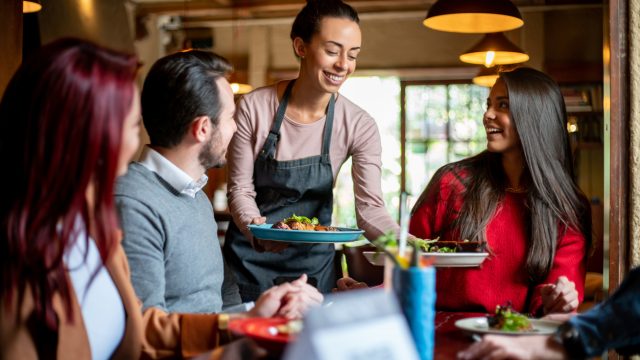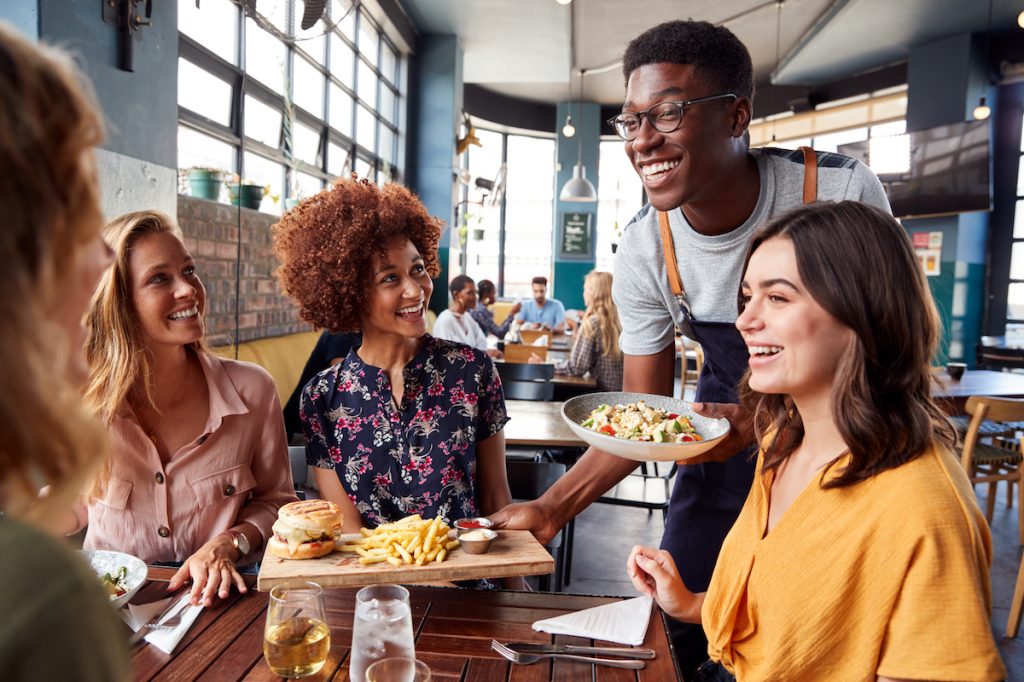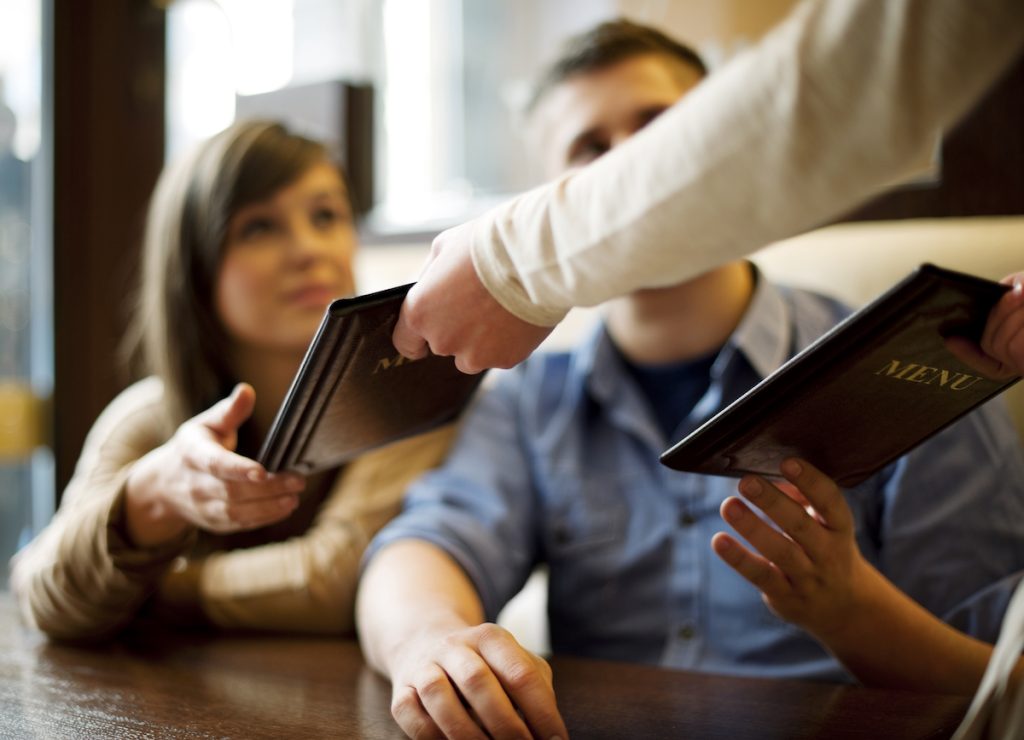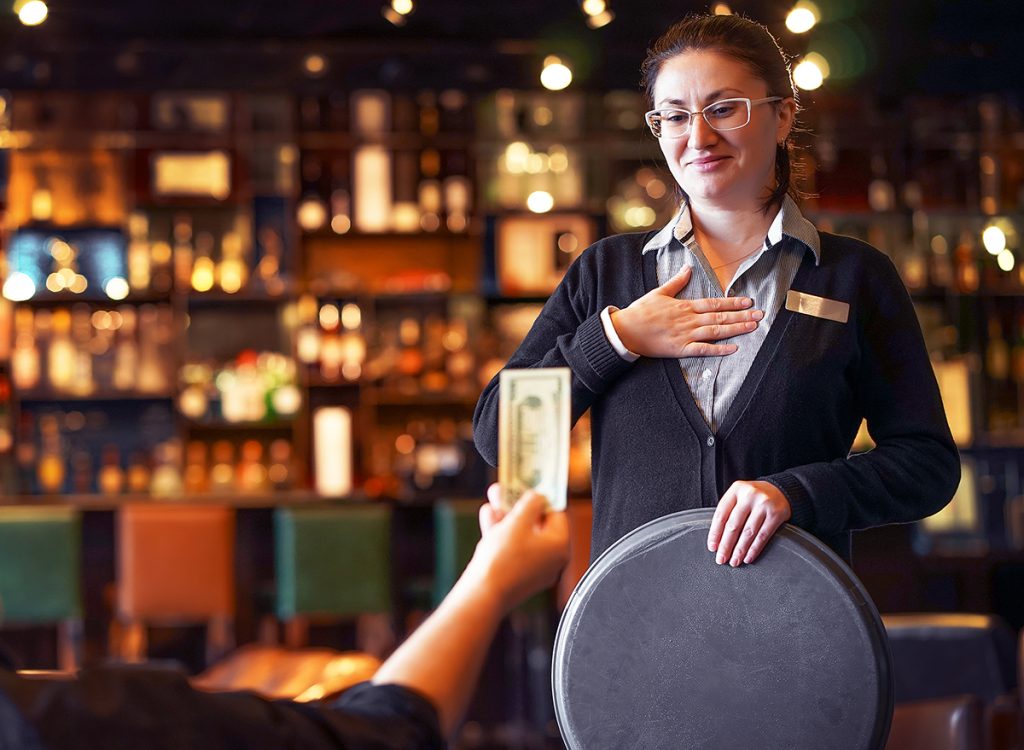6 Surprising New Realities for Dining Out, According to Etiquette Experts
Keep these pointers in mind the next time you head to a restaurant.

Even if you're a capable home cook, there's nothing quite like treating yourself to a night on the town and dining out. It can be a great way to unwind, set the right ambiance for a date, or simply enjoy a great glass of wine alongside a unique and expertly prepared dish. But in the years following the COVID-19 pandemic, it's also hard not to notice that certain elements of the experience have changed—and so have some of the norms that come with it. Read on for the surprising new rules for dining out, according to etiquette experts.
READ THIS NEXT: The 4 Questions You Should Never Ask Your Server, Experts Warn.
1
Be comfortable with contactless features.

The COVID-19 pandemic forced some changes into the dining experience as restaurants began trying to manage safety concerns. But even as the world has started to normalize, some of those seemingly temporary tweaks have likely become permanent.
"White table clothes are a thing of the past, and so is the traditional place setting as we once knew it. Even condiments and salt and pepper are no longer on the table," says etiquette expert Lisa Mirza Grotts. "A wrapped place setting is hygienic, and that [it] is handled less by employees makes the customer feel safe."
Even the way you interact with your server and settle your bill are often different than just half a decade ago.
"Many restaurants are utilizing contactless menus and contactless payment systems," says Jules Hirst, etiquette expert and founder at Etiquette Consulting. "You will need to become comfortable with these options as restaurants are attempting to minimize contact by going this route: It's safer for them and safer for the diner."
2
Realize table times may be limited.

The service industry's not-so-secret staffing struggles affect small local restaurants and large chains. As a result, restaurateurs say this is forcing them to change how they operate—including reserving the right to ask for the table back.
"Staffing has almost returned to normal, but until it fully does, we are still limited on the number of tables we can seat at any point during service," says Claire Kiamie, owner and proprietor of Kiamie Enterprises. "We have had to limit regular table times to 2 to 2.5 hours in order to accommodate as many guests as possible each night. We try to let our customers know on the front end using our reservation service but a lot of times the notice is overlooked, which is unfortunate."
If you find yourself eating out someplace that may not be fully staffed or has fewer resources available, Hirst says the new rule is to exercise more patience and understanding during your dining experience.
"The restaurant is trying to accommodate everyone, so service may take a bit longer than before," she explains. "And if you have dietary restrictions, these should be discussed when your server first visits so as to best accommodate you and give the restaurant time to plan accordingly."
READ THIS NEXT: 6 Surprising New Rules for Tipping, According to Etiquette Experts.
3
Honor your reservations—or at least update the restaurant.

Let's be clear: It's never been acceptable to ghost a restaurant if you've made a reservation, no matter what night of the week it is or what your excuse may be. But according to some hospitality experts, there's been a concerning trend where customers no longer seem to value their bookings to dine out as much as they did years ago.
"It's not just the issue of people not showing up or attempting to cancel at the last minute, which is a major problem: It's become quite common for many individuals to simply not show up," says Jonathan Kleeman, group beverage manager and executive head sommelier at the Story Group in London.
Of course, the problem comes down to depriving the restaurant of much-needed income.
"Imagine having only 10 tables, and two of them don't show up. That means 20 percent of your business for the entire evening is gone, and you've missed the opportunity to accommodate other customers," Kleeman tells Best Life. "That's why we used to see more restaurants allowing only walk-in tables or having queues outside before the pandemic."
If anything about your reservation changes—including the size of your party or arrival time—it's on you to make sure the restaurant knows.
"A simple phone call, email, or even a text message can inform the restaurant about any changes, even if it's just half an hour or an hour ahead of time," says Kleeman. "It can make a tremendous difference."
4
Be understanding of pricing changes.

Restaurants run on slimmer margins than most businesses, making them particularly sensitive to any changes in the cost of ingredients or other supplies. According to Kiamie, the cost of goods has become a huge factor that's forced a change to pricing practices at her establishments.
"We have weekly updates on the costs of the items we serve, but we cannot logically reprint menu prices each week," she says. "We have had to create an increase in menu prices with a bit of a buffer."
If you feel slight sticker shock the next time you pick up a menu, Kiamie says it's important to remember that restaurants are feeling the same kind of cost crunch as everyday consumers. Ultimately, they're doing their best to manage expectations while staying profitable.
For more life advice delivered straight to your inbox, sign up for our daily newsletter.
5
Don't air your grievances on public forums.

Review websites have made it easier to sift through options when looking to find a great new place to dine out. However, they can also do a major disservice to honest restaurants.
"Leaving a review that highlights the best aspects of your dining experience is not only nice but also helpful for future diners. However, if you have any criticisms or negative feedback, it's best to address them discreetly and in the moment," says Kristi Spencer, etiquette expert and founder at The Polite Company.
6
Consider tipping more than usual.

Everyone knows that tipping is a fundamental part of every meal at a restaurant. But due to recent changes in the industry, it may be time to reassess how you approach gratuity.
"It pays to be generous, especially during COVID, when so many people were unemployed," says Grotts. "This is one trend I hope is on the uptick."
Of course, this means you should probably be leaving more. "Tipping norms have changed: While the customary gratuity used to be 15 percent, I advise clients that the new standard starts at 20 percent," says Spencer.





















